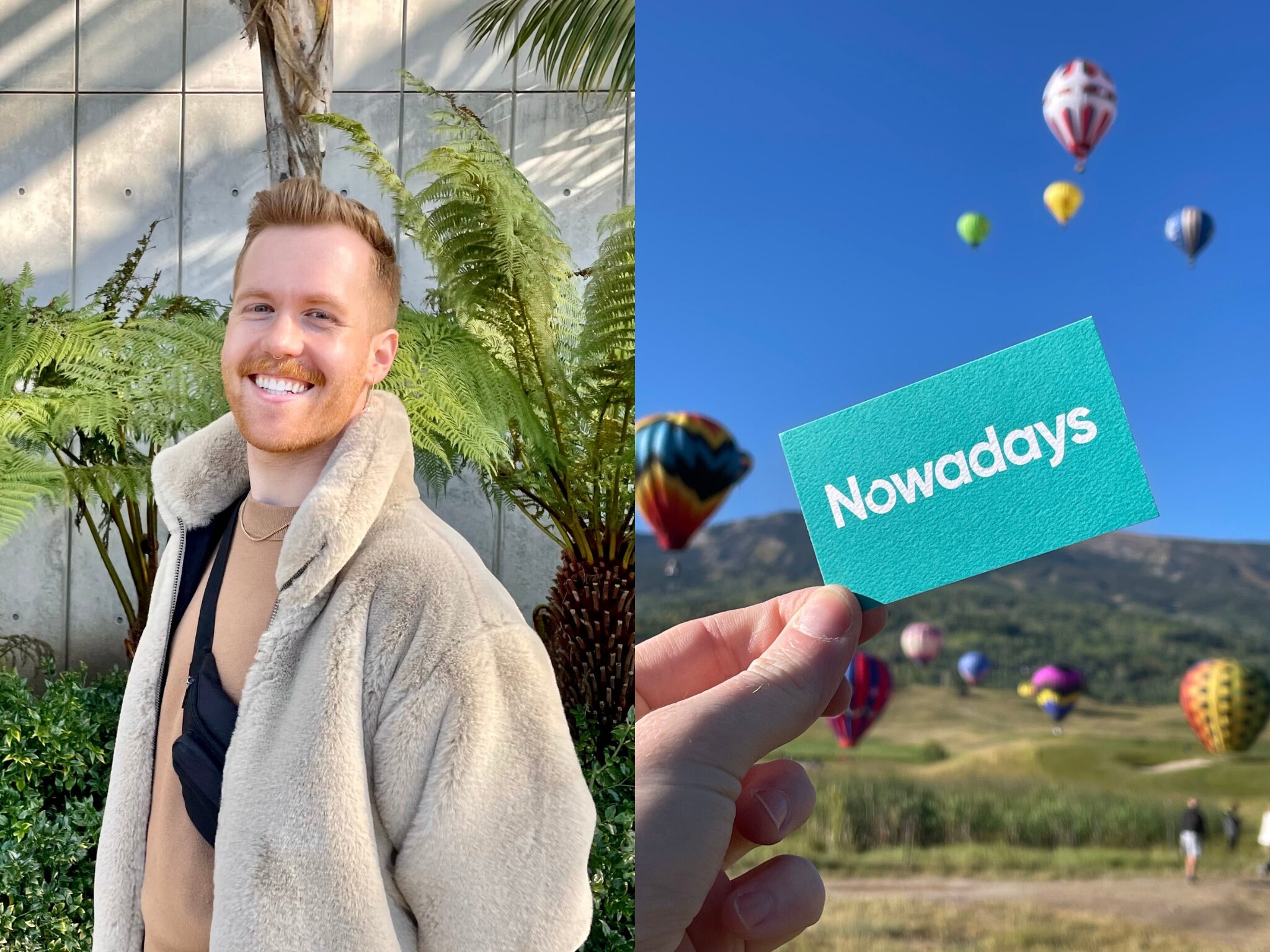Q&A with Max Elder: ‘Alt-Protein Needs to Engage the Cultural & Political Elephants’
8 Mins Read
Max Elder, co-founder of former plant-based meat company Nowadays and managing director of Food System Innovations, reflects on the journey of his vegan chicken nugget startup, explains why it was forced to cease trading, talks VC funding in food tech, and reveals if he’d do it all over again.
In August, Californian plant-based chicken startup Nowadays announced it was shutting down “due to an inability to raise venture funds in this market”, a year after it successfully closed a $7M seed funding round. The news reflected the growing fundraising pains faced by the plant-based sector – and food tech as a whole.
Elder, the company’s co-founder and CEO, noted at the time that the nuggets were performing well in D2C and retail channels, with many consumers returning to purchase more. But the financials associated with frozen food distribution for a startup of Nowadays’ scale were too steep. “The economics only work if you have the capital to really push a multi-year brand building and marketing strategy and it’s really hard to access capital now,” he was quoted as saying.
A well-respected figure in the alternative protein industry who was frequently featured in legacy media including the New York Times, the Guardian, Forbes and Fast Company, Elder had predicted that in the long term, “the headwinds for conventional proteins will only get stronger”, saying: “I think we just need to batten down the hatches and weather the storm, and sometimes that means some companies can’t survive because there’s limited access to capital.”
Since then, he has been working as the managing director of US sustainability non-profit Food System Innovations, which supports initiatives that are helping to remove animals from the global food system. We spoke to Elder about Nowadays, why it reached the end of its tether, and what the future of this industry looks like.
This interview has been edited for clarity and concision.
Green Queen: Did you see the end coming? What finally made you decide to say that’s it?
Max Elder: Every startup goes through an existential crisis between each round of financing, so all founders see the end frequently. Running a startup is a tricky balancing act of challenges and opportunities, successes and failures, growth and setbacks. There wasn’t one event that ended Nowadays – there were a plethora of factors, many outside of our control, that made it impossible to raise additional capital. We ceased operations when we became insolvent and couldn’t sustain the business any further.

GQ: If you could do it all again, would you?
ME: Absolutely. Founding a mission-driven food company is an extraordinary privilege I don’t take for granted. Building is a formidable challenge and feeding people is insanely rewarding. Most importantly, I’ve never had such a high velocity of learning in my life. I don’t plan on doing it all over again anytime soon.
I currently see a higher impact approach for how I spend my time: I’ve transitioned to work on systems-level change and category-level innovation at a public charity called Food System Innovations, co-founded by David Meyer and Galina Hale. While Nowadays was my shot on goal, I’m most excited these days by redesigning the playing field.
GQ: Do you have any big regrets? What would you do differently?
ME: I honestly don’t have any big regrets. I think there are a few I would do differently next time. The first is being more intentional about the co-founder relationship. That relationship is mission-critical and often ends at some point in a company’s journey, like it did at Nowadays. I also would have shut down Nowadays earlier than I did. It’s an insanely hard choice to make, and it’s hard to find allies in that choice.
Winding down your business is emotionally draining (layoffs, including yourself; liquidation efforts; legal) and can take a long time and cost a lot of money. I now help founders better understand what they need to responsibly wind down their business.
GQ: What are your biggest learnings? And what are you most proud of?
ME: Nowadays accomplished a lot. We built a differentiated brand, patented whole-cut manufacturing processes, launched into retail with Whole Foods Market, secured restaurant partnerships with critically-acclaimed partners, and fed a lot of people. While those are all impressive, I think what I’m most proud of is how I managed the company. Despite some really thorny problems and tough challenges, I always made values-based decisions and communicated honestly.
My biggest learning was that you can feel proud even if you don’t achieve your desired outcome as long as you hold yourself accountable to your own values. Even when I’ve failed, my values have never failed me.
GQ: You were straddling the line of processed plant-based food and ‘clean label’ with a product that had a short ingredient list. We are constantly told that processed products turn people off the plant-based category. Is this what consumers want? What’s your take on all this? Do we need more clean-label products?
ME: Meat is a $1.4T industry globally and a $180B industry in the US. The average American eats 330 lbs of meat (including seafood) annually, and about nine out of 10 Americans eat meat everyday. The market for meat is gigantic.
There are many different consumer segments who have different pain points for different meal occasions across different channels. There is no singular value proposition that consumers want. I believe food products in the US need to taste delicious and be priced competitively. For some consumers during some meal occasions in some channels, cleaner labels matter.
That said, I’m worried about the mis- and disinformation campaigns around ultra-processing and alt-proteins we’re seeing, as I see much of these concerns as industry talking points that eaters use to post-rationalise, more so than real pain points that drive purchase decisions.

GQ: Do you think the vegan nugget market is oversaturated?
ME: Market saturation at a macro level is when the supply of a product becomes higher than its demand. Sometimes this happens because the market has too many competitors offering the same product, or when the product has already reached the entirety of its customer base. While I believe there are many plant-based nugget products competing with each other, I also believe that the product hasn’t reached the entirety of its potential market.
If you think the market for vegan nuggets is only made up of vegan consumers, the vegan nugget market is oversaturated. If you think the market for vegan nuggets is made up of flexitarians, the vegan nugget market is full of blue sky. Chicken nuggets amount to an $8B market in the US; there’s plenty of room for demand capture.
GQ: What advice would you give for existing and new plant-based brands?
ME: I feel like I should be the one taking advice from existing and new plant-based brands! One pivot I made too late at Nowadays that I’d love to see other brands make is a pivot to institutional procurement. Plant-based products offer truly impressive environmental benefits that aren’t accurately priced in the market today.
While the climate crisis hasn’t quite yet become a consumer problem, it’s increasingly becoming an ESG problem. If consumer demand signals are weakening, institutional ESG commitments are getting stronger. The downside is that institutional sales cycles can be long and opaque, distribution hard to secure, and prices relatively low, but the upside is the potential for high, consistent volumes at a better margin than retail.
GQ: There’s a lot of talk about whether VC funding is the right choice for founders/startups. What’s your take? Would you take VC money again?
ME: I think the funding model you pursue needs to depend on the business you want to build. If you want to build for impact on a short-time horizon, you need a higher-risk capital source to support growth. It’s hard to imagine other sources of capital to underwrite innovative startups trying to solve big challenges quicker than venture.
GQ: Can you describe what a day in the life of a plant-based founder was like? Take us through your mental state on the average day.
ME: I think the founder role is overly romanticised. There are a lot of fun parts of the job, but a lot of the role is administrative work and constant problem-solving and making sure things get done. My days typically rotated through a cycle of strategy, fundraising, and capacity-building. I would build a strategic vision supported by core enabling milestones we planned to achieve; sell part of the company to secure the capital required to execute on that vision; and then build capacity to hit those milestones.
Throughout those cycles, my mental states fluctuated highly based on the frequency and scale of opportunities versus the frequency and scale of challenges. Some days, my mental state was calm, confident and proud. Other days, I’d be insanely stressed and not my best self. I’m so impressed with and inspired by people who build.

GQ: Do you still believe in the category? What needs to change?
ME: The more time I spend in the food and climate worlds, the more deeply I believe in alternative proteins. The problem of industrialised animal farming is only getting worse, and the alternatives are only getting better. I see truly mind-blowing innovation at a pretty fast pace for the food industry addressing an incredibly complex problem. Farmed animals are all complex living beings, so replicating their bodies with plants is a formidable task.
The industry is nascent. I see some opportunities to accelerate the protein transition across both supply and demand. On the supply side, I’m excited by the impact of choice architecture and default shifts at institutions. I’m inspired by market shaping efforts to accelerate alt-protein value chains and the potential of offtakes and advance market commitments. I’m also seeing some big improvements in taste and texture, which I hope continues, and I’m increasingly growing bullish on blended/hybrid meats (new category-level nomenclature to come).
On the demand side, I’m eager to see more category-level demand campaigns (they need funding!) and efforts to combat mis- and dis-information campaigns. Price, taste and nutrition are all necessary but not sufficient for plant-based products to break into the mainstream; we also need to understand and engage the social, cultural and political elephants in the room. All that said, I believe the alternative protein category is not a question of if, but when.



